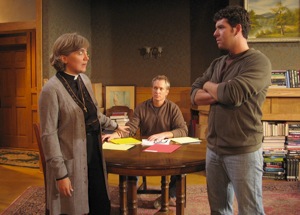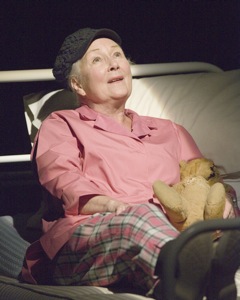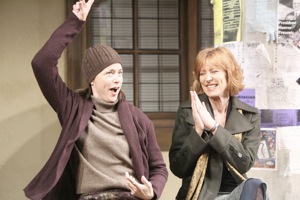-
- Obesity a problem in HIV population
- Petition to block Oregon’s domestic partnership law fails
- College town party paper calls gay men “freaks”
- Craig vows to complete his Senate term despite court loss
- Documentary explores religion and homosexuality debate through Christian parents of gays
- Manslaughter, hate crimes conviction for Brooklyn man who targeted gay victim
- National News Briefs
- World News Briefs
Arts & Entertainment
Of faith, death and fallibility
Published Thursday, 11-Oct-2007 in issue 1033
The Busy World Is Hushed
Hannah (Jerusha Matsen Neal), widowed under mysterious circumstances while in the early stages of pregnancy with son Thomas, has coped with the loss by submerging herself in religion, becoming an Episcopal priest and Bible scholar. Tom (Aaron Marcotte), now grown, has gone in the opposite direction, renouncing religion and rootlessly bouncing around the country, reappearing irregularly and unannounced on his mother’s doorstep. As a result, mother and son are estranged.
Tom walks in while Hannah is interviewing an assistant to help her with a book about a new gospel that has been discovered. She hires Brandt (Barron Henzel) despite his spectacular lack of qualifications because, she says, he is a good writer and she needs a ghostwriter to add fluency to the tumble of ideas she expresses. She also has another motive that will become clear later.
Brandt has his own problems with faith and religion: He is watching his father slowly die of a brain tumor. Ill-equipped to handle the impending loss, he uses writing and work to help him forget.
Keith Bunin’s 2006 The Busy World is Hushed plays through Oct. 28 at Diversionary Theatre, directed by Diversionary’s artistic director Dan Hirsch.
Bunin’s play is a meditation about faith as a unifying or distancing force, refuge or escape. It also poses a basic question: what must we do to make life worth living? Along the way, Bunin packs in a good deal of philosophy on love, loss and pain.
Bunin’s characters speak in fluid, complete sentences and well-articulated thoughts, nice to hear but somewhat at odds with normal human conversation. He also gives in to contrivance more often than necessary. Tom’s insistence that his mother, an obviously intelligent woman, holds onto faith as an emotional evasion doesn’t ring true (though it works as a plot device). And Brandt’s recoil at Tom’s impetuous kiss (this is Hannah’s other motive) seems phony.
Still, most of us have asked the questions these characters do, and The Busy World is Hushed presents them in entertaining and rapid-fire fashion, with a good dollop of humor thrown in.
Matsen Neal, a Baptist minister on leave, makes an auspicious Diversionary debut as Hannah, absolutely convincing as a sincere believer despite her skepticism (“The Bible is a self-contradictory, haphazardly edited compilation,” she tells Brandt).
Diversionary veteran Marcotte is excellent as the conflicted Thomas, distancing himself from his mother even while realizing she is all he has left, unable to find a reason to believe although it is right in front of him.
Henzel, as the wounded Brandt looking for any port in the impending storm, acquits himself well in the least flashy role of the three.
Bunin’s script may not be perfect, but give him points for making philosophy and religion into engaging theater.
The Busy World Is Hushed plays through Oct. 28 at Diversionary Theatre. Shows Thursday at 7:30 p.m.; Friday and Saturday at 8 p.m.; Sunday at 2 and 7 p.m. For tickets call 619-220-0097 or visit http://www.diversionary.-org/bwih.html
Oscar and the Pink Lady
“If you say the word ‘die’ in a hospital, nobody hears you,” says 10-year-old leukemia patient Oscar to the “pink lady,” a hospital volunteer who visits him daily.
Oscar, whose bone marrow transplant did not go as hoped, now knows he will die soon, even though nobody will tell him. He can tell because the doctor never looks at him and doesn’t answer his questions. “I’m now considered an obstacle to medicine,” he says.
What Oscar needs is someone to talk to about his experience. The Pink Lady, or Granny Pink (Rosemary Harris), suggests he write a letter to God. Oscar protests that he doesn’t even believe in God, but Granny Pink maintains that doesn’t matter, that God will at least listen. She further suggests Oscar consider each day a decade so that when he dies, he will be older in his imagination.
Oscar and the Pink Lady, French playwright Eric-Emmanuel Schmitt’s solo piece about the relationship between Oscar, Granny Pink and God, plays through Nov. 4 at the Old Globe’s Cassius Carter Centre Stage. Frank Dunlop directs.
Oscar and the Pink Lady is one of a quartet of Schmitt novellas about kids and spirituality. Another, Monsieur Ibrahim, was made into a lovely 2003 film starring Omar Sharif.
The redoubtable Harris (now known by millions of film fans as Peter Parker’s Aunt May in the Spider-Man series) puts a huge amount of cheerful energy into her performance, playing young Oscar, Granny and a bevy of characters of in- between ages without a false step. She’s at her most delightful describing her imaginary exploits as professional wrestler “The Incredible Midget.” But trying to make Schmitt’s philosophical argument into drama is an uphill battle, and the heavy words and two-act length eventually drag it down into monotony.
In the final analysis, Oscar and the Pink Lady is sweet but trite, with nothing new, insightful or even particularly interesting to say about a topic no one finds easy to handle.
Oscar and the Pink Lady runs through Nov. 4, at the Old Globe’s Cassius Carter Centre Stage. Shows Sunday, Wednesday and Tuesday at 7 p.m.; Thursday through Saturday at 8 p.m.; matinees Saturday and Sunday at 2 p.m. For tickets call 619-23-GLOBE or visit www.theoldglobe.org.
Third
The theater world lost a fine playwright much too soon when Wendy Wasserstein, the first woman to win the Tony for best play (Heidi Chronicles in 1989), died earlier this year at 55. She also won the Pulitzer Prize that year.
The Geffen Playhouse presents the West Coast premiere of Wasserstein’s last play, Third, through Oct. 28. Expanded from a one-act shortly before her death, Third is directed by Maria Mileaf.
Unreconstructed liberal Laurie Jameson (Christine Lahti), teaching a course on “Un-Corseting Elizabethan Drama” at an unnamed New England liberal arts college in 2002, spends much of her off time yelling at the TV news and bemoaning the failure of liberals to prevent George W. Bush from coming to power. Specifically, Laurie worries about the looming Iraq War.
Laurie lives in academic la-la land, a world nearly divorced from her family – the unseen intellectual embarrassment of a husband; younger daughter Emily (Sarah Drew), who seems determined to escape rather than join Laurie’s world, and Laurie’s aging father Jack (M. Emmett Walsh), sliding into senility. Even her best friend and colleague Nancy (Jayne Brook), now battling cancer, seems to be distancing herself.
Typical of the academic establishment, Laurie espouses free inquiry and an open society, but is hoisted on the petard of her own biases when she accuses student Woodson Bull III (Matt Czuchny) of plagiarism on his King Lear paper. Bull is a jock – a wrestler, mind you – with no academic pretensions. In fact, he wants to be a sports agent. How does Shakespeare fit into that plan?
“I don’t mind it,” he says.
The paper is, in a word, brilliant, and Laurie has no proof that Third (the third generation to go to the college, he prefers that moniker) has purloined it, but he will now have to defend it before an academic committee. It’s a bit ironic, considering that Laurie’s own crackpot notion about Lear is that Regan and Goneril were right to betray their sexist patriarch and Cordelia was a masochistic simp.
Wasserstein was at her best writing about women, and Laurie’s scenes with Emily and Nancy come across as more true and more engaging than those with Third or her father. In the end, Laurie, like all of us, must examine her own attitudes and motivations and come to grips with the fact that there are many things in her life that she cannot control.
This is a really fine ensemble cast. Lahti nails the contradictions at the heart of Laurie’s personality. Czuchry is a great gadfly, Brook terrific as Nancy, and Drew and Walsh excellent.
Wasserstein is sometimes accused of writing with a punchline mentality, and in truth she did use humor frequently and could write a one-liner with the best of them. But she spoke to a generation of women in a way that few others have.
Third plays through Oct. 21 at the Geffen Playhouse in Los Angeles. Shows Tuesdays through Thursdays at 7:30 p.m., Fridays at 8 p.m., Saturdays at 4 and 8:30 p.m., and Sundays at 2 and 7 p.m. For tickets call 310-208-5454, visit GeffenPlayhouse.com or call Ticketmaster at 213-365-3500.
|
|
Copyright © 2003-2025 Uptown Publications





